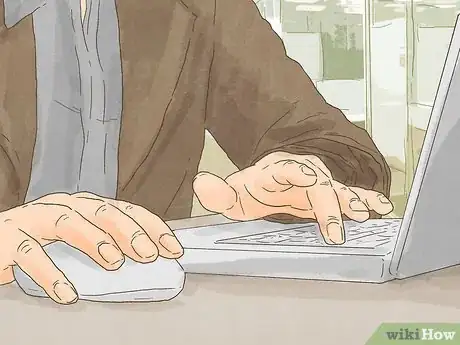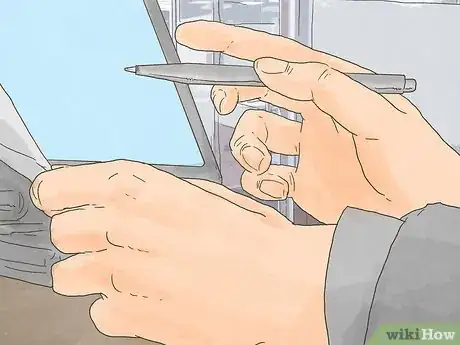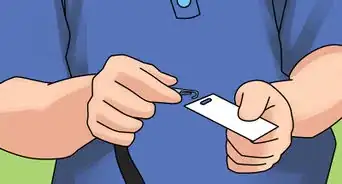This article was co-authored by Peter Fryer. Peter Fryer is a tennis writer and coach based in Derry Northern Ireland. He completed his professional teaching tennis qualification shortly after finishing university and has been teaching tennis for over 13 years. Peter began Love Tennis Blog in 2010 and contributes to the BBC and national media outlets.
wikiHow marks an article as reader-approved once it receives enough positive feedback. In this case, 100% of readers who voted found the article helpful, earning it our reader-approved status.
This article has been viewed 172,130 times.
Sports journalism is a competitive yet exhilarating job prospect. However, it takes more than just a passion for sports to get settled into the industry. In addition to having a passion for sports, becoming a sports journalist requires you to have great writing skills and quality journalism experience. By starting a blog and identifying your niche market in sports journalism, you will be that much closer to becoming a sports journalist.
Steps
Honing Your Writing Skills
-
1Start a blog. One way you can hone your writing skills is by starting your own blog. First, decide what your blog will focus on. Your blog's focus should be something you are passionate about. You want to choose something you are passionate about because you will need to create a lot of content regularly. Then, choose a blogging platform and begin blogging.
- Since your interest is in sports journalism, start a sports blog detailing commentary, highlights, and results from sporting events you attend. Also, fill your blog with stories and interviews you have conducted with athletes and coaches.
-
2Read, read, read. Reading also helps improve writing skills. To improve your writing skills as a sports journalist, start reading articles, books, editorials, and opinion pieces written by well-known sports journalists. Reading the work of professional sports journalists will expose you to the writing styles, content, and the ingenuity that is needed to be a successful sports journalist.[1]Advertisement
-
3Write for a school newspaper. You can get additional writing practice by writing for your school newspaper or for a local newsletter and/or column. Attend school sporting events and write columns detailing what happened during the event, who played well, and how the team did, for example. If you can, also conduct interviews with the players and coaches to report on in your column.
Obtaining Training in Journalism
-
1Obtain a journalism degree. Obtaining a degree in journalism will ensure that you will have the basic necessary training in order to become a sports journalist. Research journalism and communication programs that meet your personal interests. You can begin by requesting information from journalism schools that interest you. You can also meet with the program's representatives in order to see if it is right for you. Tell the representatives your future goals in order for them to assess if the program meets your needs.
- If you are getting a degree in journalism, make sure the program offers courses that will give you professional qualifications, like shorthand and media law.[2]
-
2Major in a writing intensive subject. In order to become a sports journalist, a degree in journalism is not required. A degree outside of journalism can help you diversify your writing, which will give you an edge in the world of journalism.[3] Major in other subject areas that you are passionate about and that are writing intensive. Examples of writing intensive majors are history, sociology, psychology, English, or media studies.
- Knowing a foreign language is also a major asset in journalism. It will enable you to work with different ethnic groups and cultures, and thus give you a fresh perspective for your writing.
-
3Refine your technical skills. Programs like Photoshop, CSS, HTML, and web-publishing programs are basic skills that a sports journalist needs to be familiar with. If you aren’t familiar with these skills, enroll in training programs that will help you refine these skills.
Specializing in Sports Journalism
-
1Become a sports expert. In order to write about sports, you need to be an expert in all things related to sports. There are several things you can do in order to develop a broad knowledge base. First, watch and attend as many sports games as you can. Practice memorizing coach and player names and positions on the team. Also, watch and take notes on interviews with players and coaches in order to learn the kinds of questions journalists ask.
- You can also become an expert by joining a team. By joining a team, you will become familiar with the actual mechanics of the sport, like the game's rules, the player's positions, and strategies used by players and coaches to win games. This will enable you to write more candidly about the sport as a journalist.
- Familiarize yourself with game statistics like team win-loss ratio, player ratings, and injury statistics, as well.
-
2Apply for a sports writing internship. Once you have basic training in journalism, apply for a sports writing internship. This is very important because it will give you job experience. Job experience is invaluable and will give you an edge when applying for jobs. It will also help you determine if you prefer newspaper, online, television, radio, or magazine journalism.
- You can obtain an internship through your college program. Ask your program about the internships that are available to you.
- Also, look for internships through your local newspaper, magazine, or newsletter.
-
3Find a niche. Having a niche can make a huge difference in a competitive sports journalism world. Focus on sports that you are passionate about, for example, soccer, tennis, football, or volleyball. You can also research sports that are underreported, for example, rugby. This will enable you to make your sports writing stand out and desirable.[4]
Landing a Sports Journalist Job
-
1Do freelance work. Sports journalism is a competitive job market. While an internship can give you an edge, doing freelance work while you are searching for a more stable job can enhance your resume. Find freelance work by contacting websites, magazines, newspapers, and radio stations that have regular sports reports. Come up with several writing pitches, and e-mail your best ideas to the editor of the blog, magazine, or newspaper. Do this regularly. Once you start publishing regularly, you will be able to develop a writing portfolio.
-
2Create a work portfolio. Once you have published several well-written pieces, begin compiling your best pieces for your portfolio. You do not need to include all your writing pieces. A few solid articles are better than a lot of mediocre pieces. Your writing pieces should represent you and your writing interests. If you have several pieces that cover different sports, categorize them as such. For example, have a separate category for football, tennis, and soccer.[5]
- The number of writing pieces to include varies; some jobs will specifically request a certain size portfolio. As you put yours together, be sure to include at least 8 to 10 strong pieces.
- Your portfolio should also have a brief biography detailing who you are, why you are passionate about sports writing, and why you are a great fit for the job.
-
3Prepare for the job interview. Before you go to a job interview, take time to learn about the company. Also, be ready to give examples of some of your outstanding writing pieces, and remember to bring your portfolio.
- Brainstorm different writing ideas and angles before you go into the interview, and make a list of your top three.
-
4Network and maintain relationships. Remember to network during your undergraduate studies, internship, and freelancing experience. Create relationships with your supervisor and other writers. These relationships can lead to job opportunities in the future. You can create relationships with your supervisor by being proactive and by creating quality-writing pieces.
- Remember to showcase your stuff. Post your best writing on social media outlets like Twitter and Facebook.
- You can also create your own professional website showcasing your best work. Having a professional website is an easy way for an employer to assess your skills, experience, and qualifications for a potential job.
Community Q&A
-
QuestionCan I become a sports journalist without a degree?
 Community AnswerYes, but you need to know a lot about sports. Follow sports websites on regular basis. Try to get an internship first.
Community AnswerYes, but you need to know a lot about sports. Follow sports websites on regular basis. Try to get an internship first. -
QuestionHow do I become a sports journalist if I am 14 years old?
 DonaganTop AnswererOffer to write for the sports page of your school paper.
DonaganTop AnswererOffer to write for the sports page of your school paper. -
QuestionWhat should I consider studying to become a sports journalist?
 Community AnswerYou'll want to study English, Journalism, Writing, and Public Speaking. Watch a lot of journalistic TV and YouTube videos and listen to sports radio and podcasts. Try to get involved with a small radio station, TV station, YouTube channel, or sports blog and work your way up.
Community AnswerYou'll want to study English, Journalism, Writing, and Public Speaking. Watch a lot of journalistic TV and YouTube videos and listen to sports radio and podcasts. Try to get involved with a small radio station, TV station, YouTube channel, or sports blog and work your way up.
References
- ↑ https://www.journalism.co.uk/skills/how-to-get-into-sports-journalism/s7/a552212/
- ↑ https://www.journalism.co.uk/skills/how-to-get-into-sports-journalism/s7/a552212/
- ↑ https://successatschool.org/advicedetails/182/60-Second-Interview:-Sports-Reporter
- ↑ https://www.journalism.co.uk/skills/how-to-get-into-sports-journalism/s7/a552212/
- ↑ https://blog.quiet.ly/community/how-to-create-a-writing-portfolio-for-freelancers/
About This Article
To become a sports journalist, work on honing your writing skills by starting your own blog about sports. Also, read articles and books written by well-known sports journalists, which will help improve your writing and teach you useful tips and tricks. You can also start writing for your school newspaper to get more writing practice and learn about being a journalist. See if you can report on school sporting events, like what happened during the game and who played well. Then, you can look into getting a journalism degree and focusing on sports writing. To learn how to land a job as a sports journalist, scroll down!







































































